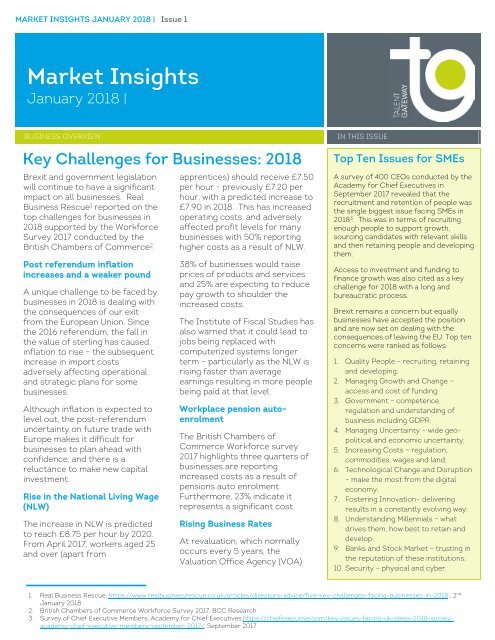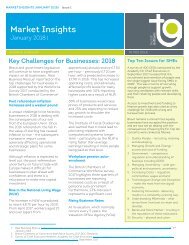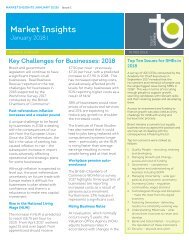Market Insights 2018 Talent Gateway
Take a look at our market insights report bringing together information on challenges for businesses and individual sectors for the forthcoming year.
Take a look at our market insights report bringing together information on challenges for businesses and individual sectors for the forthcoming year.
You also want an ePaper? Increase the reach of your titles
YUMPU automatically turns print PDFs into web optimized ePapers that Google loves.
MARKET INSIGHTS JANUARY <strong>2018</strong> | Issue 1<br />
<strong>Market</strong> <strong>Insights</strong><br />
January <strong>2018</strong> |<br />
BUSINESS OVERVIEW<br />
Key Challenges for Businesses: <strong>2018</strong><br />
Brexit and government legislation<br />
will continue to have a significant<br />
impact on all businesses. Real<br />
Business Rescue 1 reported on the<br />
top challenges for businesses in<br />
<strong>2018</strong> supported by the Workforce<br />
Survey 2017 conducted by the<br />
British Chambers of Commerce 2 .<br />
Post referendum inflation<br />
increases and a weaker pound<br />
A unique challenge to be faced by<br />
businesses in <strong>2018</strong> is dealing with<br />
the consequences of our exit<br />
from the European Union. Since<br />
the 2016 referendum, the fall in<br />
the value of sterling has caused<br />
inflation to rise – the subsequent<br />
increase in import costs<br />
adversely affecting operational<br />
and strategic plans for some<br />
businesses.<br />
Although inflation is expected to<br />
level out, the post-referendum<br />
uncertainty on future trade with<br />
Europe makes it difficult for<br />
businesses to plan ahead with<br />
confidence, and there is a<br />
reluctance to make new capital<br />
investment.<br />
Rise in the National Living Wage<br />
(NLW)<br />
The increase in NLW is predicted<br />
to reach £8.75 per hour by 2020.<br />
From April 2017, workers aged 25<br />
and over (apart from<br />
apprentices) should receive £7.50<br />
per hour - previously £7.20 per<br />
hour, with a predicted increase to<br />
£7.90 in <strong>2018</strong>. This has increased<br />
operating costs, and adversely<br />
affected profit levels for many<br />
businesses with 50% reporting<br />
higher costs as a result of NLW.<br />
38% of businesses would raise<br />
prices of products and services<br />
and 25% are expecting to reduce<br />
pay growth to shoulder the<br />
increased costs.<br />
The Institute of Fiscal Studies has<br />
also warned that it could lead to<br />
jobs being replaced with<br />
computerized systems longer<br />
term – particularly as the NLW is<br />
rising faster than average<br />
earnings resulting in more people<br />
being paid at that level.<br />
Workplace pension autoenrolment<br />
The British Chambers of<br />
Commerce Workforce survey<br />
2017 highlights three quarters of<br />
businesses are reporting<br />
increased costs as a result of<br />
pensions auto enrolment.<br />
Furthermore, 23% indicate it<br />
represents a significant cost.<br />
Rising Business Rates<br />
At revaluation, which normally<br />
occurs every 5 years, the<br />
Valuation Office Agency (VOA)<br />
IN THIS ISSUE<br />
Top Ten Issues for SMEs<br />
A survey of 400 CEOs conducted by the<br />
Academy for Chief Executives in<br />
September 2017 revealed that the<br />
recruitment and retention of people was<br />
the single biggest issue facing SMEs in<br />
<strong>2018</strong> 3 . This was in terms of recruiting<br />
enough people to support growth,<br />
sourcing candidates with relevant skills<br />
and then retaining people and developing<br />
them.<br />
Access to investment and funding to<br />
finance growth was also cited as a key<br />
challenge for <strong>2018</strong> with a long and<br />
bureaucratic process.<br />
Brexit remains a concern but equally<br />
businesses have accepted the position<br />
and are now set on dealing with the<br />
consequences of leaving the EU. Top ten<br />
concerns were ranked as follows:<br />
1. Quality People – recruiting, retaining<br />
and developing;<br />
2. Managing Growth and Change –<br />
access and cost of funding;<br />
3. Government – competence,<br />
regulation and understanding of<br />
business including GDPR;<br />
4. Managing Uncertainty – wide geopolitical<br />
and economic uncertainty;<br />
5. Increasing Costs – regulation,<br />
commodities, wages and land;<br />
6. Technological Change and Disruption<br />
– make the most from the digital<br />
economy;<br />
7. Fostering Innovation– delivering<br />
results in a constantly evolving way;<br />
8. Understanding Millennials – what<br />
drives them, how best to retain and<br />
develop;<br />
9. Banks and Stock <strong>Market</strong> – trusting in<br />
the reputation of these institutions;<br />
10. Security – physical and cyber.<br />
1. Real Business Rescue, https://www.realbusinessrescue.co.uk/articles/directors-advice/five-key-challenges-facing-businesses-in-<strong>2018</strong> , 2 nd<br />
January <strong>2018</strong><br />
2. British Chambers of Commerce Workforce Survey 2017, BCC Research<br />
3. Survey of Chief Executive Members, Academy for Chief Executives,https://chiefexecutive.com/key-issues-facing-uk-smes-<strong>2018</strong>-surveyacademy-chief-executive-members-september-2017/,<br />
September 2017
MARKET INSIGHTS JANUARY <strong>2018</strong> | Issue 1 | 2<br />
adjusts business rates in<br />
accordance with changes in the<br />
property market. Following the<br />
2017 property revaluation,<br />
businesses are faced with<br />
increased business rates. The<br />
impact has been greatest in<br />
London and the south east,<br />
affecting plans for growth and, in<br />
some instances, resulted in rapid<br />
financial decline.<br />
Not only has this damaged plans<br />
for growth and development, but<br />
in some cases it’s caused a rapid<br />
financial decline. It is expected<br />
this will continue to cause issues<br />
in <strong>2018</strong>.<br />
There is potential for this to<br />
impact commercial landlords if<br />
their tenants cannot meet these<br />
additional financial demands,<br />
subsequently affecting other<br />
suppliers and other connected<br />
businesses.<br />
Interest Rate Rise<br />
Whilst interest rates have been<br />
relatively small to date, there is<br />
scope for further increases in<br />
<strong>2018</strong>, which would impact<br />
borrowing and financing. Coupled<br />
with the other challenges likely to<br />
be experienced in <strong>2018</strong>, this could<br />
affect businesses’ plans for<br />
growth.<br />
If interest rate rises increase the<br />
value of sterling, although making<br />
imports more competitive, this<br />
would impact negatively on<br />
companies that export their<br />
products.<br />
Sector<br />
Highlights<br />
Charities<br />
The Lobbying Act,<br />
(formally the<br />
Transparency of<br />
Lobbying, Non-<br />
Party Campaigning<br />
and Trade Union<br />
Administration Act) has<br />
presented a real challenge for<br />
charities. It was originally<br />
designed to stop lobbying<br />
companies exercising undue<br />
influence over politicians by<br />
restricting their spending. Since<br />
its extension to charities, it now<br />
includes any activity by a charity<br />
which could be ‘reasonably<br />
regarded’ as intended to<br />
influence voters in England and<br />
Wales. Organisations that spend<br />
more than £20,000 in the 12<br />
months prior to the general<br />
election must register with the<br />
Electoral Commission.<br />
The Act can only be enforced<br />
seven months before any election<br />
but includes council,<br />
mayoral, European and general<br />
elections, resulting in only a few<br />
months of the year exempt. For<br />
smaller charities in particular, it<br />
has proved to be a significant<br />
barrier to forward planning<br />
campaigns 4 .<br />
Healthcare<br />
Deloitte<br />
highlights global<br />
healthcare<br />
challenges for<br />
<strong>2018</strong> 5 :<br />
Creating a<br />
positive margin in an uncertain<br />
and changing health economy<br />
continues to be one of the<br />
greatest challenges for<br />
healthcare. This is against<br />
decreased funding and increased<br />
costs to fund demand.<br />
There is a need to move<br />
strategically from volume to<br />
value with a focus on population<br />
health management, prevention<br />
and the overall holistic health of<br />
populations. This requires an<br />
evolution in job roles and<br />
technology will be critical to<br />
analysing population health and<br />
social determinants. Healthcare<br />
providers will need to respond<br />
to health policy and complex<br />
regulations as well as consider<br />
reliability of data, security and<br />
data ownership as part of this.<br />
Investment will be required in new<br />
technologies to reduce costs,<br />
increase access and improve<br />
care. From robots and AI<br />
through to 3D printing and<br />
analytics tools, technology should<br />
make healthcare less expensive<br />
and more efficient if providers are<br />
able to invest and keep up with<br />
the pace.<br />
Engaging the consumers and<br />
improving the patient experience<br />
is a key challenge with consumers<br />
reporting the biggest priority in<br />
healthcare is personalisation of<br />
care. Potential ways to increase<br />
patient experience includes<br />
telehealth, social media and<br />
virtual reality.<br />
Globally there is a severe and<br />
increasing shortage of people for<br />
clinical and leadership roles in<br />
healthcare. This is in part due to<br />
organisations being slow to adapt<br />
to new ways of working and the<br />
need to merge talent with<br />
technology.<br />
4. Challenges facing the sector, Jemma Smith, November 2017, https://www.prospects.ac.uk/jobs-and-work-experience/job-sectors/charity-andvoluntary-work/challenges-facing-the-third-sector<br />
5. <strong>2018</strong> Global Health Care Outlook, Deloitte, 2017
MARKET INSIGHTS JANUARY <strong>2018</strong> | Issue 1<br />
j<br />
Financial Services<br />
Financial Monthly reported the top<br />
five challenges for Financial Services<br />
in <strong>2018</strong> 6 . Successful social media<br />
together with evolving customer<br />
engagement was a key challenge.<br />
Social media content and practices<br />
are becoming increasingly discredited at a time when<br />
banks are trying to re-build trust. They need to find a<br />
balance between using social media channels with<br />
caution whilst not losing the opportunity to reach a<br />
large audience instantly. Coupled with this is the<br />
wider approach to customer engagement. Data<br />
mining – analyzing data to provide valuable insights –<br />
can help to better target and acquire new customers.<br />
However, it is so extensive now that the challenge is<br />
working out which insights to take forward within<br />
time and budget constraints.<br />
The Basel “IV” reforms includes a shift in the<br />
approach to risk-weighted assets (RWA) from March<br />
2019. The impact is likely to be significant with banks<br />
needing to raise more capital to comply with the new<br />
regulation.<br />
Quarterly Economic Survey Q4 2017<br />
The British Chambers of Commerce Quarterly<br />
Economic Survey is based on over 7,000 responses<br />
from businesses across the UK and is the largest<br />
private sector business survey 7 . Overall growth<br />
together with confidence is low, with businesses not<br />
enjoying the same level of growth that was seen<br />
before the EU referendum. Manufacturers have<br />
showed strong performance, but this reduced slightly<br />
at the end of 2017.<br />
Challenger banks are ‘small retail banks set up to<br />
compete for business with large long established<br />
national banks’. They have enjoyed good growth<br />
positioning themselves as ‘not a traditional bank’. It<br />
is perceived however that the “honeymoon period” is<br />
ending although they still represent a competitor to<br />
traditional banks.<br />
The Second Payment Services Directive (PSD2) was<br />
introduced in 2015 with members of the EU having<br />
until <strong>2018</strong> to implement it. It aims to make payments<br />
easier and information more accessible taking away<br />
the bank’s hold on user data (and the need for<br />
services like Visa and PayPal to make a payment<br />
online). This will signify a real shift in how payments<br />
are made with banks losing revenue from lost<br />
transactions. As part of the PSD2, payment initiation<br />
service providers (PISPs) enable merchants to make<br />
the payment request for you directly. This has been<br />
identified as a possible opportunity for those banks<br />
that can capture this market and reclaim lost<br />
revenue.<br />
Quarterly Economic Survey Q4 2017<br />
Professional and managerial staff were the most<br />
difficult category of employee to recruit. There was<br />
significant variance in recruitment difficulties across<br />
different regions.<br />
In <strong>2018</strong>, it is expected that labour and skills shortages<br />
will be the biggest barrier to growth. There is a need<br />
for businesses to invest in people and training – acting<br />
on this shortage. Currently the survey shows<br />
investment intentions remain below historical levels<br />
both for manufacturers and service firms. Nationally,<br />
government need to build an environment that enables<br />
businesses to thrive and kick start growth, giving firms<br />
the confidence to invest.<br />
Half of service firms stated they had attempted to<br />
recruit employees, with 71% facing recruitment<br />
difficulties, the highest proportion since records<br />
began.<br />
Figure 1 Percentage of firms experiencing recruitment<br />
difficulties in each region 7<br />
6. The Top 5 Challenges Facing Financial Services in <strong>2018</strong>, Financial Monthly, https://www.finance-monthly.com/2017/11/the-top-5-<br />
challenges-facing-financial-services-in-<strong>2018</strong>/, November 2017<br />
7. Quarterly Economic Survey Q4 2017, British Chambers of Commerce, 10 th January <strong>2018</strong>
MARKET INSIGHTS JANUARY <strong>2018</strong> | Issue 1 | 4<br />
Quarterly Economic Survey Q4<br />
2017: Key Highlights 8<br />
22% of manufacturers<br />
reported an increase in<br />
their workforce up<br />
from 20% on Q3<br />
14% of services firms<br />
reported an increase in<br />
their workforce<br />
unchanged from Q3<br />
23% of manufacturers<br />
expect to grow their<br />
workforce over the<br />
next three months,<br />
down from 29% in Q3<br />
19% of service firms<br />
expect to grow their<br />
workforce over the<br />
next three months<br />
down from 21% in Q3<br />
19% of manufacturers<br />
increased investment<br />
in training in Q4, down<br />
from 20% in Q3<br />
15% of service firms<br />
increased investment<br />
in training in Q4, up<br />
from 14% in Q3<br />
44% of manufacturers<br />
are confident turnover<br />
will increase in the next<br />
12 months, down from<br />
51% in Q3<br />
36% of service firms<br />
are confident turnover<br />
will increase in the next<br />
12 months, down from<br />
40% in Q3<br />
50% of manufacturers<br />
expect their prices to<br />
increase, up from 35%<br />
in Q3<br />
36% of service firms<br />
expect their prices to<br />
increase, up from 28%<br />
in Q3<br />
Hospitality and Leisure<br />
The leisure<br />
industry has seen<br />
a year on year fall<br />
on leisure<br />
spending across<br />
almost every<br />
leisure category. This is a result of<br />
pressures on consumers from<br />
rising inflation and lower wage<br />
growth. 18-34-year-olds are<br />
spending less than last year across<br />
most leisure categories including<br />
the gym, short breaks and culture<br />
and entertainment 9 .<br />
The hospitality and leisure sector<br />
is one of the sectors noted to be<br />
most affected by the increasing<br />
NLW with a greater proportion of<br />
lower paid employees.<br />
Manufacturing<br />
Manufacturing<br />
has been<br />
particularly<br />
impacted by the<br />
continued<br />
uncertainty in the<br />
economy – largely in part to<br />
stalled EU Brexit negotiations 10 .<br />
Poor productivity is an increasing<br />
problem with manufacturing<br />
output falling in 2017 despite<br />
increased hours.<br />
Automation provides a potential<br />
area to increase productivity with<br />
85% of UK manufacturers<br />
implementing some form of<br />
automation in the past 12 months.<br />
This can only be achieved through<br />
finding investment and the people<br />
with the right skills to manage any<br />
automation. “Industry 4.0” is a<br />
drive towards digital supply<br />
chains, smart manufacturing and<br />
digital products together with<br />
data analytics as a key<br />
competency. Automation also<br />
exacerbates the skills shortage in<br />
the sector. In addition, young<br />
people are not entering the labour<br />
market with the right skills and<br />
competencies and the uncertainty<br />
over post-Brexit immigration<br />
controls compounds the problem<br />
– a significant problem in the<br />
manufacturing industry.<br />
Consumer spending is falling, and<br />
the industry has seen a continued<br />
lack of demand for products which<br />
provides further unknowns for<br />
manufacturing.<br />
Media and Entertainment<br />
Key concerns for<br />
the media and<br />
entertainment<br />
sector center<br />
around changing<br />
consumer<br />
behaviours, availability of key skills<br />
and volatile energy costs 10 . CEOs<br />
are more optimistic about growth<br />
compared with last year, with<br />
opportunities in streaming, videoon-demand<br />
services,<br />
improvements in content<br />
discovery and mobile video.<br />
A key area of concern for the<br />
industry is changing consumer<br />
behaviour with technology.<br />
Companies are focusing on digital<br />
and technological capabilities and<br />
innovation to adapt to the<br />
changing market and attract<br />
consumers.<br />
There is a critical skills gap in the<br />
sector with leadership and<br />
creativity as the hardest skills to<br />
source. 40% of CEOs in the sector<br />
expect the number of employees<br />
to reduce with the introduction of<br />
new technologies over the next<br />
five years. The industry is<br />
expected to lose more jobs to<br />
technology than most others and<br />
needs to recruit the right people<br />
to fulfil the roles that can’t be<br />
performed by machines.<br />
8. Quarterly Economic Survey Q4 2017, British Chambers of Commerce, 10 th January <strong>2018</strong><br />
9. Passion for Leisure: A view of the UK leisure consumer – Q3 2017, Deloitte, https://www2.deloitte.com/uk/en/pages/consumer-industrialproducts/articles/passion-for-leisure.html<br />
10. 20 th CEO Survey, PWC, https://www.pwc.com/gx/en/ceo-agenda/ceosurvey/2017/uk/key-findings.html
MARKET INSIGHTS JANUARY <strong>2018</strong> | Issue 1<br />
Pharmaceutical and Life<br />
Sciences<br />
CEOs in the<br />
pharmaceutical<br />
and life sciences<br />
sector are<br />
confident of<br />
growth with US,<br />
China and Germany cited as the<br />
most important countries for<br />
short term growth 11 . The UK falls<br />
in fifth place – a significant<br />
increase on previous years.<br />
Innovation is seen as a key area to<br />
focus on to facilitate growth with a<br />
need to deliver greater value for<br />
less cost.<br />
Over-regulation remains an<br />
important concern for the sector<br />
together with pricing pressures<br />
and uncertainty in US markets. An<br />
emerging concern is the speed of<br />
technological change together<br />
with availability of key skills and<br />
cyber threats.<br />
Leadership skills were deemed of<br />
top importance to CEOs followed<br />
by problem solving, creativity and<br />
innovation. These skills are cited<br />
as being the most difficult and<br />
Pharma CEOs are more likely to<br />
move their talent around to<br />
overcome this.<br />
Retail and Consumer<br />
The retail and<br />
consumer industry<br />
remain positive<br />
about their growth<br />
both organically<br />
and through cost<br />
reductions together with new<br />
alliances, mergers and<br />
acquisitions 11 . This is felt more for<br />
consumer rather than retail<br />
businesses.<br />
The sector is less impacted by<br />
automation and technology and<br />
have a focus on innovation in<br />
driving business forward.<br />
Technology is seen as having less<br />
of an impact when compared to<br />
other industries over the next five<br />
years.<br />
For retailers, the wider business<br />
issues of the weak pound, cost<br />
inflation and business rate<br />
increases together with NLW have<br />
created challenges.<br />
Technology<br />
The availability of<br />
key skills and risk<br />
of a cyber attack<br />
are the top two<br />
greatest threats<br />
perceived by UK<br />
Technology<br />
CEOs 11 . 97% of UK CEOs stated<br />
their business was addressing<br />
cyber breaches affecting business<br />
information or critical systems. It<br />
is accepted that cyber security<br />
must be invested in to avoid such<br />
breaches.<br />
UK technology businesses are<br />
focused on building their digital<br />
and technological capabilities to<br />
make the most of new<br />
opportunities, viewing digital skills<br />
as a critical element of this.<br />
Despite this, businesses are<br />
struggling to source candidates<br />
with the appropriate skills. The UK<br />
is behind in terms of exploring<br />
artificial intelligence and the<br />
impact on future skills required.<br />
UK technology businesses see an<br />
increasing competitive<br />
environment as a result of new<br />
technology with it significantly<br />
reshaping the competition.<br />
Transport and Logistics<br />
Globally CEOs<br />
confidence in the<br />
transport and<br />
logistics sector<br />
continues to<br />
decline due to<br />
over regulation<br />
and geopolitical uncertainty 11 .<br />
Digital and technological<br />
capabilities is regarded as more<br />
important than innovation or<br />
human capital in order to exploit<br />
new opportunities. Whilst<br />
technology has had less of an<br />
impact in the five years prior<br />
relative to other industries, it is<br />
viewed as significantly impacting<br />
the sector moving forward.<br />
Over half of CEOs in the sector<br />
plan to hire more employees with<br />
problem solving, adaptability,<br />
leadership, creativity and<br />
innovation being of greatest<br />
importance. Digital skills are also<br />
important and viewed as difficult<br />
to recruit.<br />
Overall CEOs in the UK are more positive about their own businesses’<br />
growth compared to 12 months ago. UK businesses are expecting to<br />
recruit and develop people faster to take advantage of opportunities<br />
when compared with CEOs globally.<br />
CEOs are focusing on ‘tackling cyber threats, monitoring UK<br />
negotiations to leave the EU and addressing skills shortages’.<br />
Overall, the PwC 20 th annual CEO survey – ‘based on a global research<br />
sample of over 1,300 global leaders that included 126 UK CEOs –<br />
suggest that UK CEOs are staying calm and determined as they<br />
continue to pursue growth in an uncertain world 11 .<br />
11. 20 th CEO Survey, PWC, https://www.pwc.com/gx/en/ceo-agenda/ceosurvey/2017/uk/key-findings.html
Attract | Recruit | Retain | Develop








